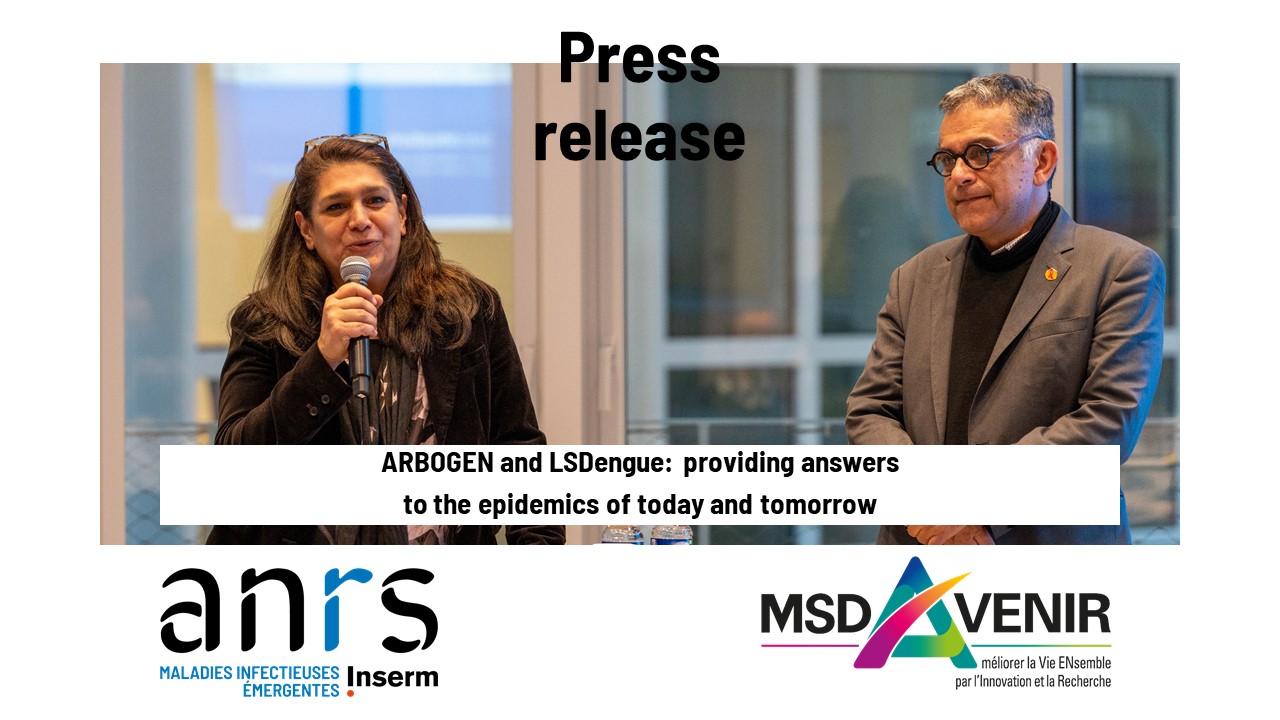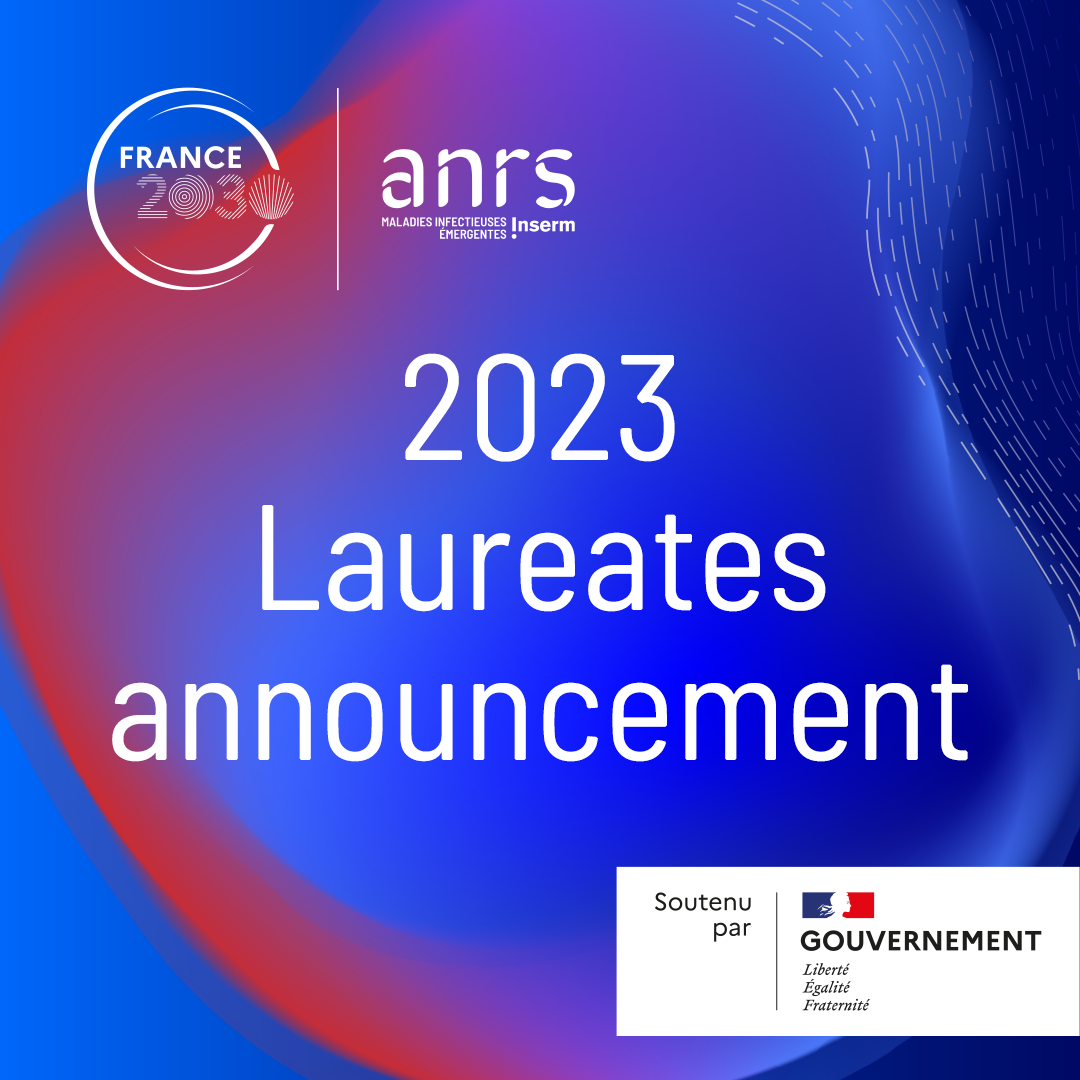
ARBOGEN and LSDengue: providing answers to the epidemics of today and tomorrow
Dr Golriz Pahlavan, Chair of MSDAVENIR's Scientific Advisory Board, and Prof. Yazdan Yazdanpanah, Director of ANRS MIE, at the presentation of LSDengue and ARBOGEN on January 25, 2024.
Last updated on 19 August 2025
The essential
Every year, the dengue virus causes 390 million infections, and 3.9 billion people are currently exposed to it[1]. Finding answers to the dengue epidemics of today and tomorrow is a major challenge for the ANRS Emerging infectious diseases (ANRS MIE), particularly through the LSDengue project. MSDAVENIR, the 1st endowment fund in France and Europe dedicated to life sciences, has also responded to this challenge by supporting the ARBOGEN project.
[1] https://www.who.int/fr/news-room/fact-sheets/detail/dengue-and-severe-dengue, consulted on 19/01/2024
Dengue, a growing challenge overseas and beyond
Dengue fever occurs mainly in tropical and subtropical regions around the world. Overseas, Martinique and Guadeloupe are currently affected by a dengue type 2 epidemic[1]. Similarly, in Polynesia, a native case of dengue type 2 was confirmed in early January 2024 in Mahina, raising fears of a potential new epidemic wave on the island of Tahiti[2]. For its part, the island of La Réunion, after the 2021 epidemic peak linked to serotype 1, currently seems to be experiencing a lull[3].
As indicated in 2019 by the Lancet’s international multidisciplinary collaboration, via its report on health and climate change, dengue is favored by recent climate developments since the 2000s. In fact, nine of the ten years with the most favorable climate for dengue transmission have been recorded since 2000[4]. What’s more, the 2023 edition of the Lancet report indicates that dengue transmission could jump by 36% by 2050[5].
Today, the regions affected by dengue fever are gradually expanding, particularly in Europe. Indeed, Aedes albopictus, the mosquito that carries the dengue virus (DENV) in Europe, has established itself in several southern European countries and, over the last ten years, has moved north and west. By 2023, this species, which has the ability to enter winter diapause, has been identified in over 20 European countries[6].
Between 2010 and 2023, 273 native cases were recorded in Europe. In mainland France, 2 cases of local transmission were reported for the first time in 2010, and 65 cases of autochthonous dengue were diagnosed in 2022[7].
Last year, for the first time, an autochthonous dengue outbreak involving 3 cases was identified in the Île-de-France region[8], demonstrating a progression of autochthonous transmissions towards the north of France.
[1] https://www.santepubliquefrance.fr/les-actualites/2023/l-epidemie-de-dengue-declaree-en-martinique-et-en-guadeloupe-protegez-vous, consulted on 19/01/2024
[2] https://la1ere.francetvinfo.fr/polynesie/tahiti/polynesie-francaise/deuxieme-cas-de-dengue-de-la-saison-pas-encore-d-epidemie-mais-attention-1456172.html, consulted on 19/01/2024
[3] https://www.lareunion.ars.sante.fr/node/16837, consulted on 19/01/2024
[4] https://www.thelancet.com/pb/assets/raw/Lancet/Hubs/climate-change/TL_Countdown_ExecutiveSummary_French-1573659911007.pdf, consulted on 19/01/2024
[5] https://www.thelancet.com/pb-assets/Lancet/Hubs/countdown/translations/French_Lancet_Countdown_2023_Executive_Summary-1700054097183.pdf, consulted on 19/01/2024
[6] https://www.nature.com/articles/s41598-021-89096-5, consulted on 24/01/2024
[7] https://www.ecdc.europa.eu/en/all-topics-z/dengue/surveillance-and-disease-data/autochthonous-transmission-dengue-virus-eueea, consulted on 25/01/2024
[8] https://www.mesvaccins.net/web/news/21518-cas-autochtones-de-dengue-chikungunya-et-zika-en-europe-cette-annee-2023, consulted on 19/01/2024
LSDengue and ARBOGEN, two innovative dengue projects
LSDengue is based on the analysis of clinical, genetic, virological and immunological data from people with a severe form of dengue fever, regardless of their place of residence in the French overseas territories. ARBOGEN is based on the collection of DENV genomes circulating in the French ultra-marine and mainland territories.
The geographical distribution of French medical and scientific teams, from New Caledonia to Marseille, via Martinique, Guadeloupe, French Guiana, Polynesia and La Réunion, is a real opportunity to develop these research projects for dengue fever and other emerging zoonoses.
In fact, France has top-level experts and is in an exceptional position to monitor and study dengue in its global genetic diversity, but also within varied environments and different populations.
LSDengue, in search of new biomarkers
Mortality among cases of severe dengue remains low (between 0 and 2%), but can reach 10% if care is delayed. The discovery of new biomarkers to optimize patient care is therefore urgently needed.
The LSDengue project is part of the “Emerging Infectious Diseases (EID) and Nuclear, Radiological, Biological and Chemical (NRBC) Threats” national acceleration strategy of the Health Innovation 2030 section of France 2030, with funding from the Emerging infectious diseases priority research programme and equipment (PEPR MIE). LSDengue aims to identify new determinants of the onset of severe dengue fever, some of which could be used to optimize patient management.
Building on the CARBO cohort, this project will enable a large-scale study to be set up, with the complete characterization (clinical, genetic, virological and immunological) of hundreds of patients with diverse genetic backgrounds, recruited from a large part of the geographical range of DENV. Using the data collected as part of this project, teams led by Prof. André Cabié of Martinique University Hospital will study associations between host and virus factors, as well as clinical outcomes. This will enable multivariate models to be built, providing a systemic view of the determinants of severe dengue fever.
ARBOGEN, genomic monitoring of arboviruses
Headed by Raphaëlle Klitting, head of genomics at the Centre National de Référence des Arbovirus, Unité des Virus Émergents, Inserm 1207, ARBOGEN is a project of unprecedented scope in terms of resources and geographical area studied. It should substantially increase our knowledge of DENV genetic diversity and its impact on disease severity. 5% of reported clinical cases will be genomically sequenced as part of ARBOGEN. Ultimately, the aim is to lay the foundations for the development of new treatments, as well as better management of the disease in its broadest sense, by adapting treatments, vaccination and diagnostic methods to the “genetic profile” of the circulating virus.
Funded by a partnership between ANRS MIE and the MSDAVENIR endowment fund, ARBOGEN will establish a transterritorial network of public and private collaborators to collect DENV genomes from dengue cases in France. This effort will lead to the generation of a large set of DENV genomes, unrivalled in terms of size, quality and richness, and will be the starting point for an in-depth study of the genetic determinants of the virus involved in the pathogenesis of severe dengue. This study could help identify new therapeutic targets and markers to anticipate disease progression and adapt patient care.
These data will also make it possible to study the genetic determinants of the virus, which influence the severity of the disease by limiting the effectiveness of control methods. Ultimately, the research efforts concentrated within ARBOGEN should make it possible to rapidly adapt epidemic countermeasures and reduce the burden caused by severe dengue fever.
As Xavier de Lamballerie, Director of the Émergence des pathologies virales laboratory, Université Aix-Marseille, points out, these projects are both essential for structuring the community of researchers in mainland France and the French overseas territories, but they also have the potential to involve other centers, in Europe and beyond, in arbovirus genomics.
About
About ANRS Emerging infectious diseases
ANRS Emerging infectious diseases (ANRS MIE), created on January 1, 2021, is an autonomous Inserm agency headed by Professor Yazdan Yazdanpanah. Its mission is to lead, evaluate, coordinate and fund research into HIV/AIDS, viral hepatitis, sexually transmitted infections, tuberculosis and emerging and re-emerging infectious diseases, in particular emerging respiratory infections – including Covid-19 – viral hemorrhagic fevers and arboviroses. Under the supervision of the Ministry of Higher Education and Research and the Ministry of Health and Prevention, ANRS MIE federates an inter-institutional network of national and international doctors and researchers, patient associations and representatives of civil society, fully integrated into the governance and operation of the agency. This co-construction dynamic ensures that projects are implemented in line with the expectations of the communities concerned, and aims to limit the health, economic and social impact of epidemics.
Find out more: https://anrs.fr/
About MSDAVENIR
MSDAVENIR is a fund to support research in healthcare and the life sciences created by the pharmaceutical company MSD France in March 2015. Since its launch, MSDAVENIR has supported nearly 370 researchers in France, through 91 projects in 8 research fields. 18 patents have been filed and over 490 publications published in top-level international scientific journals. With a total endowment of 117 million euros, MSDAVENIR is the largest research endowment fund on the European continent. Through these public-private collaborations, the fund’s mission is to advance research on scientific subjects as well as in societal fields related to research, education and health.
Find out more: msdavenir.fr
Download the press release
Press contacts
ANRS MIE : Scientific communication and information department, information@anrs.fr
MSDAVENIR : Emmanuelle Klein, emmanuelle.klein@lauma-communication.com, tel. +33 (0)6 70 98 68 20
Find out more

Announcement of the laureates of the Call for Proposals PEPR MIE 2023
France 2030: 11 winning projects for the 2023 PEPR MIE call for projects, funded to better understand and prepare to respond to emerging infectious diseases for nearly 22 million euros.
08 November 2023
